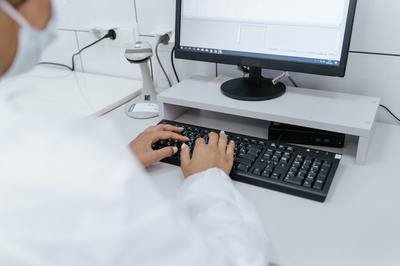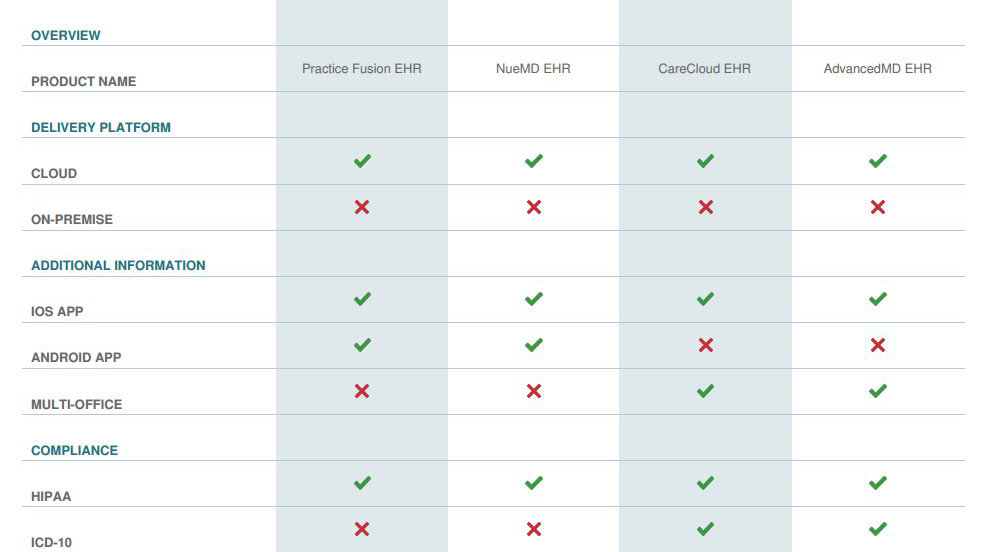General Practice EHR Buyers' Guide
General practices can benefit from a much broader variety of EHR products than their peers in specialty practices.
However, there is a tendency to assume that most of these products offer the same core features. Actual functionality in EHRs for general practitioners can therefore become a secondary consideration to other factors in the selection process, such as price and vendor support.
One should not just assume general practice EHRs all contain the same features. The products on the market today offer an array of sophisticated features that complement and enhance their clinical mission while providing useful tools to manage the volume and variety of patient conditions GPs encounter.
What requirements do general practices have for EHR software?
General practices are usually the ‘first port of call’ for patients who are worried that something is wrong. Consequently, GPs deal with a broader range of conditions and patient demographics than specialty practices, so an EHR needs to be able to assist practitioners in providing appropriate treatment or referring to specialty practices.
Get an in-depth guide to the EHR selection process with this EHR selection survival guide
Essential requirements to consider include:
- Outpatient appointments: GPs deal with outpatients, who may need to make and change appointments on a regular basis. An EHR should provide an easy-to-use patient portal to minimize missed appointments and facilitate patient booking
- Interoperability: patients with more severe conditions are referred from GPs to specialty providers, so an EHR for general practice should be able to integrate easily with those used by other practices.
- Prescribing: GPs write and manage prescriptions on a day-to-day basis, so an EHR with extensive e-prescribing features is a must-have.
Which features should you look for in an EHR for general practice?
A general practice EMR should offer support to the needs presented by patients in this setting, particularly the diverse variety of conditions treated among a high volume of patients, who in many cases require referrals to other providers.
There’s no ‘specialty feature set’ for general practice EHRs as such, but at a minimum, an EHR for general practice should contain what the Institute of Medicine (IOM) has identified as eight core care delivery functions.
An EHR for GPs should also contain functionality necessary to meet Meaningful Use Stage 3 requirements. The list of features below incorporates the eight core care delivery functions identified by IOM and required functionality under Meaningful Use stage 3, and offers functionality that can help practices cost-effectively deliver higher quality care.
The above points make the following features essential for general practice EMR systems:
- Health information and data: EHRs should store patients' diagnoses, allergies, lab test results, and medications while remaining HIPAA-compliant.
- Result management: all providers participating in the care of a patient should be able to access new and test results
- E-prescribing and order management: this allows healthcare providers the ability to enter and store orders for prescriptions, tests, and other services to enhance legibility, reduce duplication, and improve the speed with which orders are executed.
- Clinical decision support: using reminders, prompts, and alerts, EHRs can help your practice improve compliance with best clinical practices, and ensure regular screenings where required.
- Electronic communication and connectivity: efficient, secure, and readily accessible communication among providers and patients to improve the continuity of care, increase the timeliness of diagnoses and treatments, and reduce the frequency of adverse events.
- Patient portal: as well as a useful booking and messaging tool, tools a patient portal can be used by patients to access health records, provide interactive patient education, and help carry out home-monitoring and self-testing to improve control of chronic conditions. Patients, or authorized third parties, should be able to view, download, and transmit their health information within 24 hours of it becoming available, or be able to do so through an ONC-certified API for third-party applications.
- Practice management software features: these are administrative tools, designed to improve efficiency and provide more timely services to patients. It is important to note that the difference between EHR and practice management software: EHRs are mainly concerned with clinical tasks whereas practice management enables practices to provide better clinical care through making the administrative side of practices more efficient, such as billing and staff scheduling.
- Reporting and population health: electronic data storage that employs uniform data standards will enable healthcare organizations to respond more quickly to reporting requirements, including those that support patient safety and disease surveillance. Reporting and population health features should also offer the ability to submit immunization data and receive immunization forecasts and histories from the public health immunization registry/immunization information system (IIS), and also to provide syndromic surveillance data from a non-urgent care ambulatory setting for EPS.
Get more feature ideas with this guide to 50 features to look for in your next EHR
The following features are not essential, but could improve patient satisfaction and make your practitioners' live easier - if you have the extra budget.
- Some EHRs have fully-integrated telemedicine modules, which allow providers to conduct appointments over a video or phone call. If your practice is thinking of introducing or expanding its telehealth appointments, finding an EHR with integrated telemedicine functionality will streamline the experience both for the patient and the healthcare provider.
- Integrated billing modules streamline the billing process, and make it easier for your finance department to process claims, understand why claims were rejected and minimize lost revenue.
- Voice recognition: voice recognition frees up your physicians to fully engage with their patients, rather than having to constantly disappear behind a computer to type up notes. Of course, it's perfectly possible to have strong patient-provider relationships without this feature, but if you want to make your physicians as accessible as possible, this is a good place to start.
How much does EHR for general practices cost?
How much general practice EMRs cost depends on a number of variables - we go into them in detail in this guide to budgeting for EHR projects.
A Health Affairs study found that a typical multi-physician practice would spend about $162,000 to implement an EHR, with $85,500 for first-year maintenance costs.
When looking at the more detailed pricing of medical software programs, the cost for a general practice EHR can ranges from $15,000 to $70,000 per provider, according to several studies reported on the HealthIt.gov website.
For up-to-date pricing info, check out our EHR software pricing guide
If priced on a SaaS ‘per user per month’ model, a review of general EHR products indicates that costs can start at $25 per user/month, and continue upwards of $300 per user/month for more advanced systems.
Which vendors shoulf you consider for general practice EHR?
When selecting the best EHR for GPs, general practices should consider their needs from a financial perspective and from the standpoint of what features will best meet their practice’s needs. The system also needs to to be financially sustainable; being too ambitious with your budget will lead to complex financial issues further down the line.
Epic
Epic’s EHR, is regarded as a solid EMR choice for private practices, offering a standard EHR suite that contains an integrated practice management system, and is available in on-premises and cloud-based deployment.
Epic’s system can also be accessed through its mobile interfaces - Haiku for smartphones, Canto for tablets and Limeric for the Apple Watch. Epic’s software focuses on enhancing the quality of clinical care through its decision support modules, population health management tools, and patient engagement features.
MEDENT
MEDENT's best EHR for solo practice, as rated by Medical Economics, offers billing and practice management software in addition to a standard EHR suite which can be accessed remotely through a companion mobile app.
Through its primary EHR dashboard, Chart Central, users have one-click access to patient records, messages, documents, and labs. Users can bookmark areas in the system they use most. The interface also provides a generalized and longitudinal view of patient’s history with new items highlighted for quick identification.
athenahealth
athenahealth is regarded as one of the best EHRs for family practice. In addition to core EHR functionality, the system also provides users with the benefit of fully-integrated practice management and billing solutions.
Rated #1 by KLAS for ambulatory practices with 11-75 providers, Athenahealth’s workflow design is designed for efficiency and quality care through an integrated EHR homepage. The homepage offers a single view of urgent tasks and other priority items in need of follow up. This includes a fully automated daily schedule which pulls in all the necessary information on patients, including the reason for visit and symptoms documented during intake. Athenahealth also supports quality of care through its Epocrates clinical decision support system.
drchrono EHR software
drchrono EHR is a fully integrated medical practice software, medical billing software, RCM and practice management platform. drchrono’s features include mobile device compatibility (iPad, iPhone, and Apple Watch), and users can annotate diagrams, radiology images, and other files using an iPad's built-in camera. Users can also access the system’s prescribing functions via the mobile interface.
One of the more exciting features found in the system is the ability to automate patient check-ins, documentation, and prescription needs. In the area of patient engagement, the patient personal health record app (PHR) allows patients to check in through an app-based interface.















